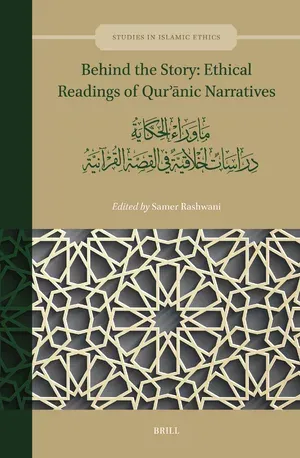
New Release on the Ethical Dimensions of Qurʾānic Narratives
We are delighted to announce the publication of Behind the Story: Ethical Readings of Qurʾānic Narratives, edited by Dr. Samer Rashwani. This book, now available as an open-access e-book and in hardback, offers an in-depth exploration of the Qurʾānic narrative as a literary genre with profound moral significance.
About the Book:
This sixth volume in the Studies in Islamic Ethics series brings together fresh insights into the ethical dimensions of Qurʾānic narratives. It highlights how these narratives have influenced Islamic moral thought in areas including law, theology, Sufism, politics, and arBy analyzing the ethical messages embedded within Qurʾānic stories, the contributors uncover the narratives' relevance and impact, not only in historical Muslim thought but also in non-Muslim scholarly contexts spanning mysticism, art, and applied ethics.
Key Features:
- New Perspective on Qurʾānic Narratives: One of the first comprehensive studies to position Qurʾānic stories as a genre with a distinct moral and ethical framework.
- Broader Disciplinary Reach: Examines the impact of Qurʾānic narratives across multiple disciplines, from Islamic law and theology to mysticism and art.
- Essential Resource: A valuable reference for students, scholars, and general readers exploring the ethical interpretations of Islamic texts.
Contributors:
Taira Amin, Halla Attallah, Bilal Badat, Fatih Ermiş, Mohammad Fadel, Hannelies Koloska, Samer Rashwani, Emmanuelle Stefanidis, and Devin Stewart.
Table of Contents
Acknowledgments vii
List of Figures viii
Notes on Style, Transliteration, and Dates ix
Notes on Contributors x
Introduction 1
Samer Rashwani
Part 1
Re-thinking the Qurʾānic Narratives
1. The Story of Two Brothers
Archetypes of Peace and Rivalry 9
Samer Rashwani
2. “Signs for Those Who Can Decipher Them”
Ancient Ruins in the Qurʾān 44
Devin J. Stewart
3. Divine and Human Hospitality in the Narratives of Sūrat al-Ḥijr
Towards Qurʾānic Narrative Ethics 93
Hannelies Koloska
4. Sacrifice, Liberalism and the Qurʾān’s Revisionist Reading of the Akeda
An Islamic Contribution to the Political Theology of Democracy 120
Mohammad Fadel
5. The “Para-narrative” Aims of Qurʾānic Narrating
An Examination of the Story of Solomon and the Queen of Sheba in the Qurʾān and Bible 152
Taira Amin
Part 2
The Qurʾānic Narrative and Its Reception History
6. The Reception History of the Qurʾānic Narrative and Morality 185
Samer Rashwani
7. Sharpening Intuitive Knowledge
Sufi Storytelling for Instilling Virtues 210
Fatih Ermiş
8. Disability Rhetoric and Ethics in the Qurʾān’s Narratives
A Literary Analysis of Speech and Hearing in Q 21:51–72 and Q 20:9–43 234
Halla Attallah
9. The Narrativisation of Qurʾānic Verses and the Formation of Ethics
Prefatory Traditions in Ottoman Calligraphy 257
Bilal Badat
10. Qurʾānic Narratives in d’Herbelot’s Bibliothèque Orientale (1697)
An Ethical Reception of Islamic Scripture in Early Modern Europe 279
Emmanuelle Stefanidis
Index of Names and Places 313
Index of Terms 321
Available Formats:
- E-Book (PDF): Available as an open-access publication, ISBN: 978-90-04-68316-7
- Hardback: Available for purchase, ISBN: 978-90-04-68315-0, EUR €79.00
- 🔗 Access the book here to explore the ethical readings of Qurʾānic narratives and their implications for both Islamic and broader moral studies.
Editor
Dr. Samer Rashwani (PhD 2007) is a senior researcher at the Research Center for Islamic Legislation and Ethics (CILE), Hamad Bin Khalifa University (HBKU), Doha. He has published the monograph Manhaj al-Tafsīr al-Mawḍūʿī lil-Qurʾān al-Karīm: Dirāsa Naqdiyya (“The Methodology of Thematic Interpretation of the Qurʾān: A Critical Review,” Dār al-Multaqā, 2009), in addition to several edited volumes and articles on Qurʾānic and Islamic Studies.
